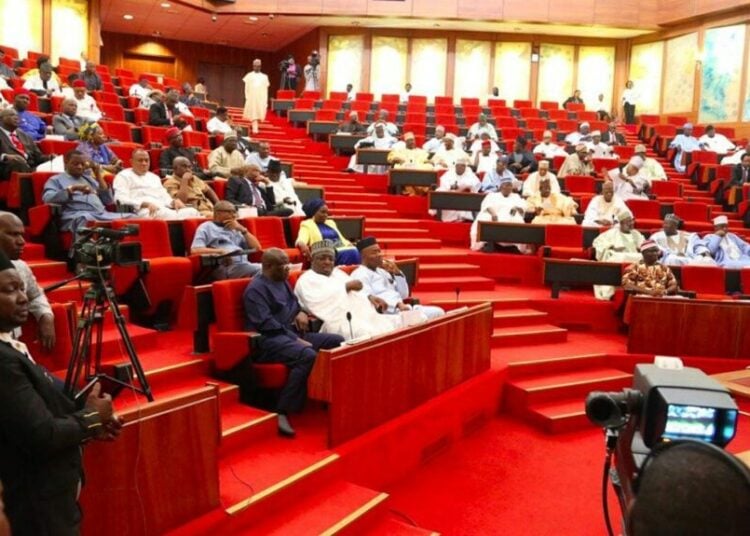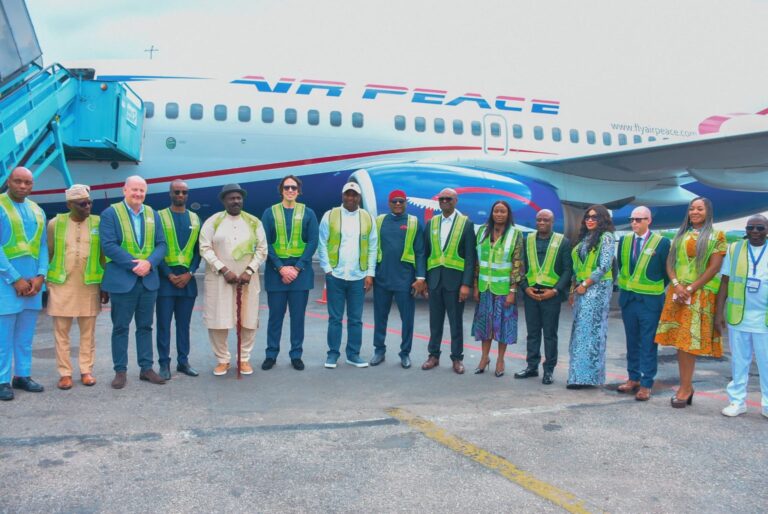
Chinedu Eze
Last week’s delivery of Boeing B777 to Air Peace by AerCap on dry lease arrangement marked the beginning of a new era for Nigerian carriers to expand capacity and become competitive in the global aviation sector.
The dry lease delivery was actualised after of a long struggle by the Minister of Aviation and Aerospace Development, Festus Keyamo, to remove Nigeria from lessors’ blacklist and return them to the aircraft dry lease market.
Although it was a tortuous journey, its positive result is soothing. The delivery of was celebrated because it was the first after more than 10 years struggle and thus reopened the opportunity for Nigerian airlines to acquire aircraft through dry leasing.
With the new possibility, airlines can provide more seats for the flying public, join the international mart and compete effectively. Also air fares will come down and the airlines will create more jobs for airport caterers and other service providers in the aviation industry and beyond.
To make the development possible, the federal government had to sign a guarantee before AerCap release its aircraft to Nigeria.
By signing guarantee for Air Peace, the federal government showed the confidence it has in its airlines. This is the first time a Nigerian government has done such for an airline. It also showed how committed the federal government in helping businesses in Nigeria thrive.
Industry insiders commend the minister for his altruistic commitment and it is worth noting that he succeeded a minister who was known to mock Nigerian carriers for their lack of capacity and who reeled out the debts owed by domestic airlines like the first verse of a daily sermon during press conferences. Such utterances were a total disincentive to investment in the aviation industry.
Through Keyamo’s push, Nigeria achieved its aircraft leasing practice direction, through the domestication of the Cape Town Convention, followed by the Federal High Court issuing a Practice Direction in 2024 to provide a clear legal framework for handling aircraft leasing disputes. The process was initiated by the government to address the challenges Nigerian airlines faced in leasing aircraft, and the new rules are designed to boost investor confidence by creating a more predictable legal environment.
Keyamo also facilitated the signing of the updated IDERA (Irrevocable Deregistration and Export Request Authorisation) procedures alongside the Director-General of the Nigeria Civil Aviation Authority (NCAA). The signing was an administrative and procedural step to comply with the Cape Town Convention and to make it easier for Nigerian airlines to access dry-lease aircraft by building confidence for global financiers and lessors.
To appreciate what President Tinubu’s administration has achieved, there is need for a retrospect. There was a time Nigerian airlines were reneging on the dry lease terms they had with lessors. The two of such incidents that went viral in the media, involved two airlines that refused to release the aircraft they leased to the lessors. In order to insist on holding the aircraft, they went to court which ruled in their favour, thus putting the Nigeria Civil Aviation Authority (NCAA) in a quandary.
NCAA signed the Cape Town Convention on behalf of Nigeria in 2010. The Convention stipulates that lessors are free to take back their aircraft if airlines reneged on the terms of agreement and it is the responsibility of the regulatory authority to ensure that it happened; so, going to court was negating that regulatory provision. That was why it intervened belatedly in these two cases but by then, the lessors had unofficially blacklisted Nigerian carriers.
Peeved by the blacklist, former Managing Director of Virgin Nigeria Airways, Capt Dapo Olumide, in a paper he presented at that period said Nigerian airlines were notorious for defaulting on leasing agreements. He recalled that some airlines in the past used litigation to hold back leased aircraft and when the lessors came for them the court would rule against their taking them back. In fact, there were occasions leased aircraft were allowed to rot away in Nigeria because the lessee airlines refused to return them after they had defaulted in agreement.
There is difference between wet lease and dry lease of aircraft. A wet lease includes when an airline leases an aircraft, which usually includes the aircraft, crew, maintenance, and insurance, providing a complete operational package from the lessor to the lessee.
In contrast, a dry lease provides only the aircraft, with the lessee responsible for all other aspects, including crew, maintenance, and insurance. The choice between them depends on a company’s needs for operational control versus a hassle-free, all-inclusive solution.
Dry lease comes at relative cheap terms in the consideration of cost, but it demands trust, integrity, high maintenance standards, and good record of past performance. This is because the lessor is giving his aircraft to an airline to manage. For the airline to do this efficiently, it must have reliable maintenance personnel, well trained cockpit and cabin crew and good performance record. While wet lease is short term leasing of about six months, for example, dry lease could go from two years to six years or more. Dry lease costs one-third of the cost of wet lease. Experts explained that the money an airline can spend in wet leasing one aircraft can be used to lease three aircraft of the same type.
During the arrival ceremony, held at the Zulu Terminal Complex, Murtala Muhammed Airport, Lagos on Friday, Air Peace Chairman, Dr. Allen Onyema, expressed profound gratitude to all partners and the Nigerian government, especially Minister of Aviation, Festus Keyamo, for fostering an enabling environment that made the dry lease possible. He reaffirmed the airline’s unwavering commitment to safety, integrity, and national representation, adding that Air Peace remains focused on expanding its fleet and network to enhance connectivity and economic growth across Africa.
In his remarks, Keyamo, described the achievement as a turning point in restoring global trust in Nigerian aviation, citing ongoing reforms such as the IDERA framework designed to protect investors and enhance transparency. He further revealed plans to rebuild the Lagos International Airport, facilitate wide-body aircraft acquisitions, and establish a Nigerian Aircraft Leasing Company to help indigenous airlines access modern fleets under strengthened regulatory systems.
The minister also commended Air Peace for setting industry benchmarks and emphasized that the Federal Government would continue supporting indigenous carriers to reclaim a larger share of Nigeria’s growing aviation market.
Vice President of Leasing at AerCap, Gad Wavomba, described the event as “a historic moment for Nigeria and the region.”
Wavomba emphasised the significance of the achievement, noting that a decade had passed without a dry lease transaction in the country, following a period during which Nigeria had been effectively blacklisted in the global leasing market due to regulatory and compliance challenges.
He highlighted the collaborative efforts that made the transaction possible. According to him, “We owe a lot of thanks to the Nigerian government for their initiatives, the NCAA for facilitating the 83-Bis Agreement, the Irish Civil Aviation Authority, and the Irish Ambassador, who came from Abuja to support this process. But most importantly, we thank Air Peace. They trusted us, worked tirelessly, and demonstrated financial transparency and discipline every step of the way.”
The airline said the partnership between Air Peace and AerCap represented a major step in restoring global confidence in Nigerian aviation, unlocking opportunities for fleet expansion, operational growth, and enhanced connectivity. For Air Peace, the addition of the Boeing 737-700 NG reinforces its position as a trailblazer in West and Central Africa, underpinning its commitment to safety, efficiency, and international standards.
About six years ago, THISDAY in a report called on the federal government to wade into the lessors’ blacklist of Nigerian carriers. Without the federal government wading in, Air Peace would not have made this advancement.
SOURCE: THIS DAY NEWS PAPER





